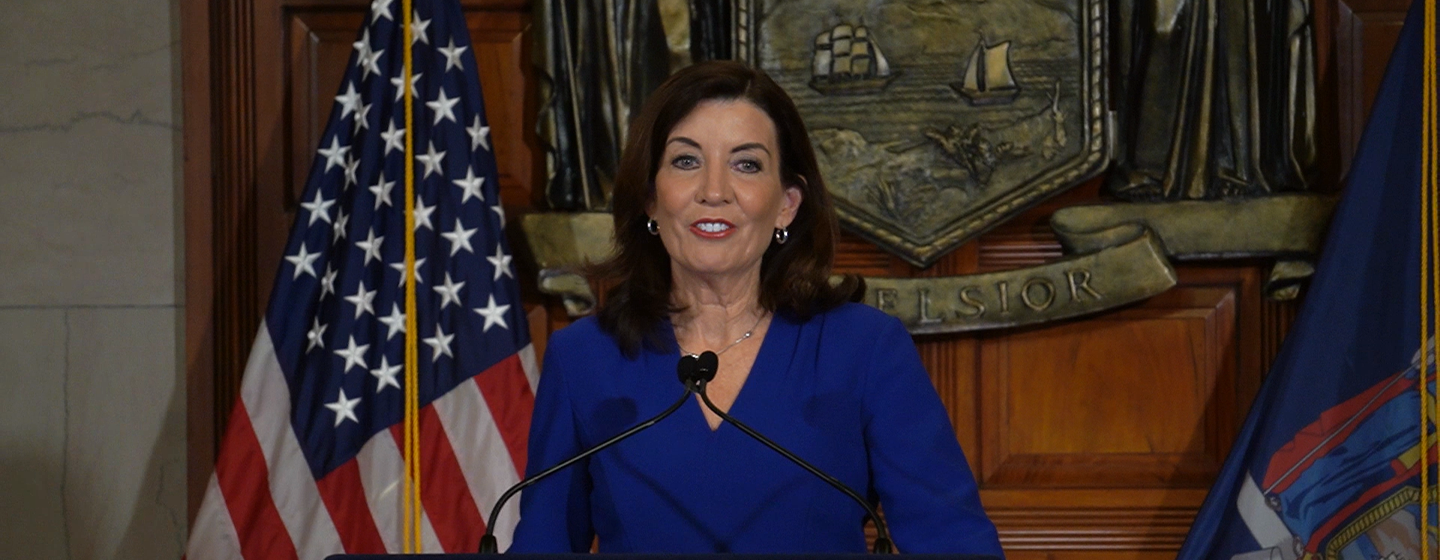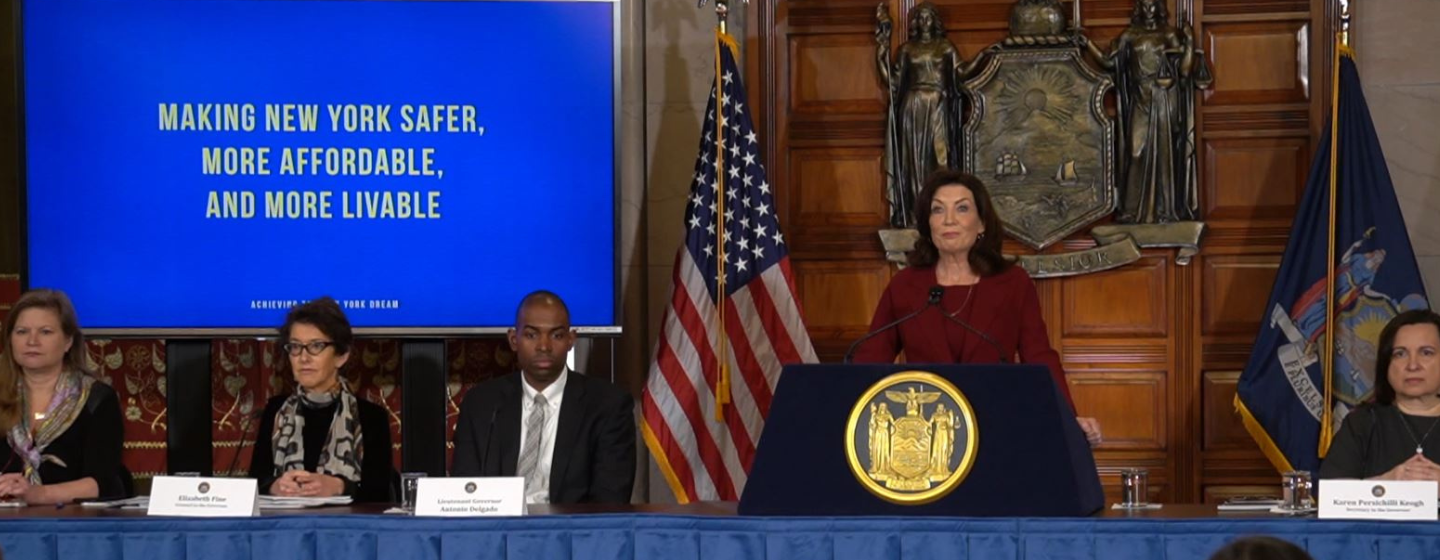Governor Hochul’s Budget Priorities Rejected by Legislature, Creating Tension for Final 2 Weeks

Legislature's rejection of Governor Hochul's key spending priorities sets up a rocky two weeks until the budget is due
Democrats in the New York State legislature are rejecting several of Governor Kathy Hochul’s key budget priorities, setting up for a battle, just two weeks before the state spending plan is due.
The Senate and Assembly, in their budget plans did not include a proposal by Hochul to make more changes to the state’s 2019 bail reform laws, which ended most forms of cash bail. The governor would like to amend the law to make it easier for judges to set bail for more “serious crimes.” She would eliminate a provision of the law that says judges must consider what are known as “the least restrictive means” necessary to ensure that an accused person returns for their court date.
Senate Leader Andrea Stewart-Cousins says she wants hard evidence that the bail law changes really are contributing to a recent crime spike. She points to a study by John Jay College of Criminal Justice released March 14th, that shows bail reform lowered recidivism rates for those charged with misdemeanors and nonviolent crimes. And Stewart-Cousins says judges have always been able to set bail for violent felonies.
“Violent offenders have always been bail eligible,” said Stewart-Cousins. “And that’s what, I think, people have not understood.”
Both the Senate and Assembly budgets also rejected two of Hochul’s key education proposals- raising tuition at public colleges and universities, and changing state rules to allow for the creation of more charter schools.
Hochul’s proposal would have allowed public colleges and universities to raise tuition each year by 3% per year for college campuses and up to 6% for university centers. The Senate and Assembly instead want to increase state aid to campuses.
Their plans also do not include the governor’s proposal to change the rules on charter schools to create more than 100 new schools. The state’s teachers unions strongly oppose the charter school expansion.
Assembly Speaker Carl Heastie says the votes aren’t there for the proposals, but he did not rule out more discussion with the governor.
“There’s minimal support overall in the Assembly for charters,” Heastie said. “But it’s all part of negotiations.”
Lawmakers are also saying no to a key tenet of Hochul’s ambitious housing development plan. The governor wants to let the state override local zoning laws, in some cases, to expedite the building of multi-family homes and other developments. The Senate and Assembly plans would instead offer more direct grants to suburban communities that agree to add more dwellings.
Senate Leader Stewart-Cousins says it’s more important to have community buy-in than to try to force localities to build housing.
“There has to be a more collaborative approach,” She said.
Both houses also failed to include Hochul’s proposal to ban flavored tobacco products. Convenience store owners oppose the idea, saying it would lead to more black market sales. Opponents say it contradicts the state’s policies on the emerging cannabis industry, where sales of flavored products are allowed.
In addition to axing many of Hochul’s key priorities, lawmakers added several new proposals, many backed by progressive-leaning Democrats. They include, in the State Senate’s budget, the tenant protection measure known as Good Cause Eviction. The State Assembly did not include the bill, but said its goal is to protect tenants from “arbitrary and capricious rent increases” and to prohibit unreasonable evictions of paying tenants.
And both houses support increasing the tax rates on wealthy New Yorkers making more than $5 million dollars a year.
Senate Leader Stewart-Cousins says ordinary New Yorkers are struggling with higher costs due to inflation, and she believes the rich can afford to pay a little more.
“We are just asking those who have the most to contribute a bit,” she said.
Both houses also want to modify the governor’s proposal to link the minimum wage, to the annual rate of inflation. The Senate would like to first raise the amount, which is $15 downstate and just over $14 upstate, to account for the high rate of inflation that has already occurred in the past year and half. That new rate would then be indexed to the annual inflation rate. The Assembly budget expresses support for a higher minimum wage but does not detail any specific plan.
Republicans, who are in the minority party in both houses, weighed in on the democrats’ budgets. Senate Republican Leader Robert Ortt says the Senate democrats’ plan, at $9 billion dollars above Hochul’s $227 billion dollar proposal, spends too much, more than the states of Florida and Texas combined.
“I just fail to comprehend how they believe this is sustainable,” said Ortt. “When New York is already…un-investible.”
And Ortt says the democrats’ rejection of Hochul’s bail reform changes means democrats are not taking the crime problem seriously.
The divergence between Hochul and democrats in the legislature comes after a disagreement over the choice of the next chief judge. Democratic Senators said they did not back Hochul’s choice of Hector LaSalle for the job. But the governor continued to press for her nominee, asking for a full floor vote, where LaSalle was rejected.
Hochul and Senate Leader Stewart-Cousins have said publicly that the differences over the judicial nominee will not color budget negotiations.
Hochul, speaking on Monday just before the legislatures’ budgets were released, says she’s willing to fight for her proposals, including the bail reform changes even if talks have to go past the March 31st deadline.
“I would like an on-time budget,” Hochul said. “But I also know that I’m here to do the work of the people of New York State, and they expect me to not leave town until the job is done.”
Last year, the governor held up the budget for nine and won criminal justice changes, including revisions to bail reform.
Ultimately, Hochul holds more power in the budget negotiations than do the lawmakers. The governor can put all of her spending priorities in a bill, and then present it to the legislature with a choice. Either they can accept it, as is, or risk a government shutdown.
Related

Inside the NY State Budget Process with Assembly Speaker Carl Heastie
The State Senate and Assembly respond to Gov. Hochul's spending plan with their own one-house budgets.


